 Petzlover
Petzlover Both Chantilly/Tiffany and Ginger Tabby are originated from United States. Both Chantilly/Tiffany and Ginger Tabby are of same weight. Chantilly/Tiffany may live 4 years less than Ginger Tabby. Both Chantilly/Tiffany and Ginger Tabby has same litter size. Chantilly/Tiffany requires Low Maintenance. But Ginger Tabby requires Moderate Maintenance
Both Chantilly/Tiffany and Ginger Tabby are originated from United States. Both Chantilly/Tiffany and Ginger Tabby are of same weight. Chantilly/Tiffany may live 4 years less than Ginger Tabby. Both Chantilly/Tiffany and Ginger Tabby has same litter size. Chantilly/Tiffany requires Low Maintenance. But Ginger Tabby requires Moderate Maintenance
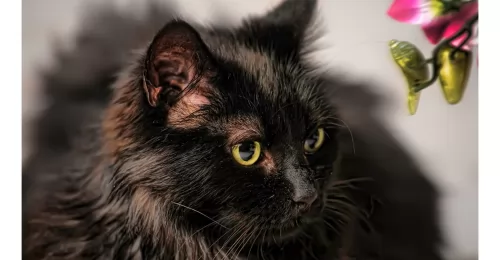 The beautiful Chantilly/Tiffany cat gets people thinking the cat is a semi-longhaired Burmese, but of course, it's not.
The beautiful Chantilly/Tiffany cat gets people thinking the cat is a semi-longhaired Burmese, but of course, it's not.
The way the Chantilly came about was that there were a pair of chocolate-colored cats but their origins were unknown. The first litter of Chantilly kittens was born in New York in 1969 and people were so taken up by the beautiful kittens that a breeding program was started.
The cat was first started as a foreign longhair and then it changed to Tiffany. In a British registry, a cat breed that was a cross between a Chinchilla Persian and a Burmese was named the Tiffanie and renamed Chantilly and referred to as the Chantilly/Tiffany.
The breed is recognized by most major cat registries.
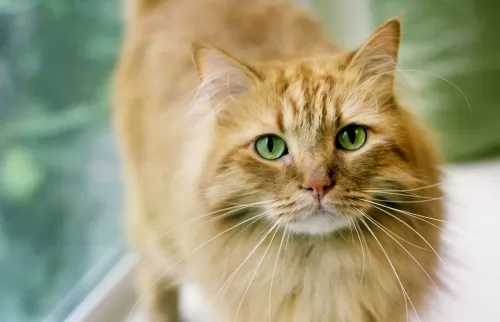 All ginger cats are tabbies – they have spots and stripes on their coat. The tabby pattern is a common wild type, and it is believed that medieval cats were tabbies.
All ginger cats are tabbies – they have spots and stripes on their coat. The tabby pattern is a common wild type, and it is believed that medieval cats were tabbies.
Most paintings and medieval manuscripts show them to be tabbies. Many people believe that these ginger cats come from a particular breed but this isn’t the case.
Ginger Cat Appreciation Day takes place in September. These cats, known as Orange Tabby Cats are very popular and they can actually have a yellow-, orange or red fur.
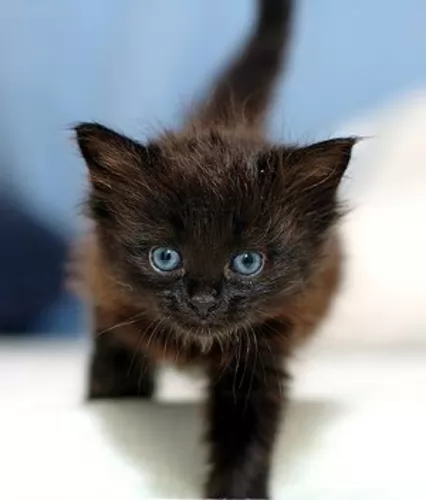 The cat has a fairly broad head with widely spaced ears of medium size. The eyes are oval-shaped and gold in color. The fur is semi-long and there is no undercoat. The tail is plumed.
The cat has a fairly broad head with widely spaced ears of medium size. The eyes are oval-shaped and gold in color. The fur is semi-long and there is no undercoat. The tail is plumed.
Apart from the original chocolate brown of the cat, other colors of the coat can include fawn, cinnamon, black, lilac and blue, with the chocolate brown being the favorite color.
The Chantilly promises to be a devoted and loyal feline companion for you, much preferring the company of his human family than to being alone.
It gets on well with other pets in the house as well as with respectful, gentle children. He isn't a demanding cat and he tries to talk with his family by chirping. It’s a balanced cat, with a fair share of docility and energy, making the cat an ideal companion for single people, couples, families, and elderly people.
It’s a cat that is so devoted, it will follow his human family around the house.
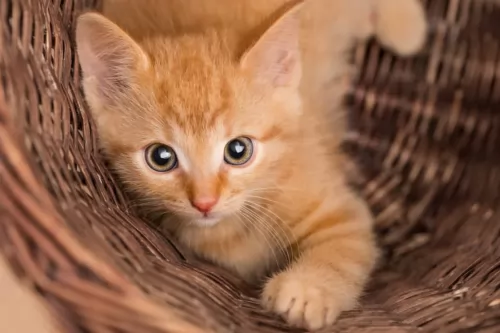 Ginger cats have different patterns to the short or long silky coats – mackerel or striped, spotted, patched, ticked, and classic.
Ginger cats have different patterns to the short or long silky coats – mackerel or striped, spotted, patched, ticked, and classic.
In fact the Ginger Tabby isn’t referring to a specific cat breed but rather a distinct color pattern. These cats get their ginger coloring from the pigment pheomelamin, the pigment red-headed humans also have.
The Ginger Tabby can range in size so generally they’re between 3 -6kg in weight. It also seems that a higher number of ginger or orange tabbies are male, put down to genetics. The eyes of the cat can be green, gold or copper.
The Ginger Tabby just loves being around his human family and to show his pleasure, you’ll hear loud purring.
They are affectionate cats and aren’t afraid to show you. These cats have a reputation for being friendly but you also have to bear in mind that a cat’s personality depends on their early socialization with people and other cats.
The Ginger Tabby is an independent, bold, courageous cat with a feisty nature.
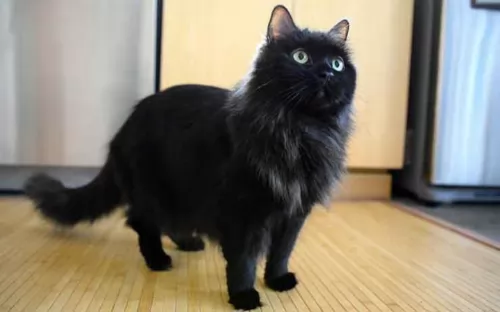 The Chantilly/Tiffany is a gentle and kind breed that is playful and easy-going. They are just your typical middle-of-the-road cats that are not too much or too little of anything.
The Chantilly/Tiffany is a gentle and kind breed that is playful and easy-going. They are just your typical middle-of-the-road cats that are not too much or too little of anything.
The Tiffany is playful, docile, happy and content and he wants to be your friend and companion.
If you are looking for a breed of cat that is loyal to its human family, allow this cat into your home... you won't have any regrets.
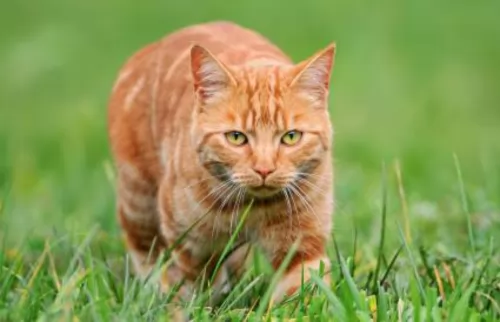 The link between personality and hair color is a talking point among humans, and so it is with cats.
The link between personality and hair color is a talking point among humans, and so it is with cats.
The Ginger Tabby, with its marmalade shade coat is feisty, playful, bold, courageous, and interesting.
Certainly, when you bring this cat into your home, not only are you going to have a beautiful cat but one that is full of character and charm.
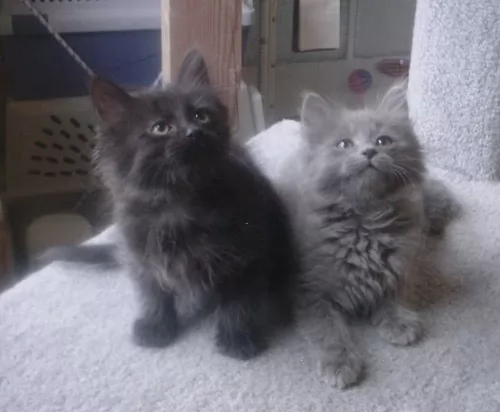 There is no health issue that the Tiffany is prone to. Like any cat, a healthy diet will keep the Tiffany healthy for years.
There is no health issue that the Tiffany is prone to. Like any cat, a healthy diet will keep the Tiffany healthy for years.
These cats are known to have delicate digestive systems so avoid foods with grain if possible. The Tiffany has full hair in their ears, and wax build-up can occur so the inside of his ears must be checked. Checking the ears once a week, as part of a regular routine that includes brushing, and tooth care, should be sufficient to keep the ear canals clear.
Other issues, which are not detrimental but should be kept in mind, are reports that the Tiffany has delicate digestion. This cat relies on a regular diet that doesn't chop and change often.
Because the Tiffany is a low-shedding cat, it is thought to be a popular breed with those people who are allergic to cat hair.
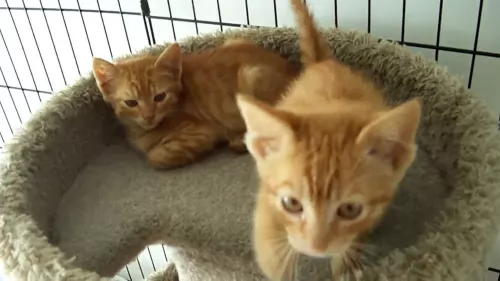 Guard your ginger tabby against eating too much and guard against a diet that is nutritionally inadequate as this contributes to poor health.
Guard your ginger tabby against eating too much and guard against a diet that is nutritionally inadequate as this contributes to poor health.
Cats are carnivores and live on meat but you can speak to your vet about giving your cat the chance of a long life by feeding him proper amounts of a healthy diet.
Make sure he also gets plenty of exercise. Offer him things to climb on, such as an indoor climbing tree so that he can exercise when you’re not there. This is important for helping him stay physically and mentally fit.
All cats are susceptible to bacterial and viral infections. Deadly diseases like this are preventable through vaccination. Vaccines offer protection from other dangerous diseases like feline leukemia virus.
All kinds of parasites – internal and external can invade your cat and make him miserable and sick and a trip to the vet is imperative.
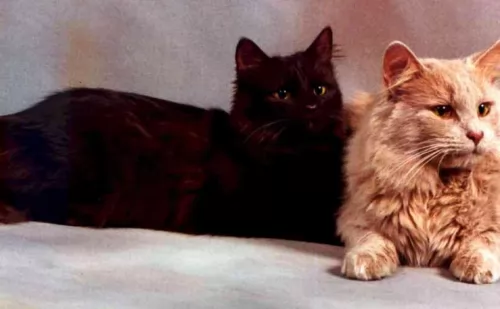 The Chantilly needs an excellet diet and exercise to ensure he doesn’t become to overweght. Remember that cats are carnivores, and this means they have nutritional requirements that can only be met with meat – they can never do well on a diet high in carbohydrates and will develop digestive problems. Your cat will also require clean, fresh water aroud thd clock to ensure his good health.
The Chantilly needs an excellet diet and exercise to ensure he doesn’t become to overweght. Remember that cats are carnivores, and this means they have nutritional requirements that can only be met with meat – they can never do well on a diet high in carbohydrates and will develop digestive problems. Your cat will also require clean, fresh water aroud thd clock to ensure his good health.
Ensure each cat you have has a litter box andencourae good litter box habits by cleaning th litter box every day. Keeping the litter box clean also alerts you anything unusual with your cat’s toilet habits.
Provide your cat with a scratching post and a climbing tree.
The cat doesn’t have an undercoat and is therefore easy to groom. With his semi-long hair, you can brush him once a week to keep the coat soft and shiny. The coat is also low shedding.
Check inside his ears and inside his mouth to ensure there is no redness and signs of infection.
Schedule regular vet visits for your cat for his cat vaccines and for when he is sick.
Spay or neuter your cat to prevent unwanted kittens. Spaying and neutering prevents uterine infections and certain cancers in the felines.
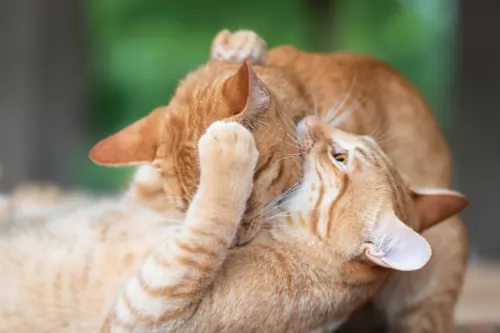 Have your Ginger Tabby cat spayed or neutered. In females, the ovaries and uterus are removed and in males the testicles are surgically removed.
Have your Ginger Tabby cat spayed or neutered. In females, the ovaries and uterus are removed and in males the testicles are surgically removed.
This common op has health benefits and decreases the likelihood of certain types of cancers in your pet. Very importantly it eliminates the possibility of your pet becoming pregnant or the male cat getting out and fathering unwanted litters. The world has too many unwanted kittens and cats as it is.
Brushing your Tabby cat will help with shedding. If you brush your Tabby once a week, you’ll remove all those loose hairs that gives your cat an ungroomed look. Cats shed more in Spring and Autumn and then you may want to increase your brushing to twice a week. Bear in mind that if your cat has shedding which is abnormal it could well be a nutritional thing. Diet is everything. He may not be getting the right mix of ingredients. Speak to your vet as your Tabby may be requiring more of certain vitamins in his diet.
Clip your cat’s nails and make a point of checking inside his mouth for bad teeth and inside his ears for wax and dirt buildup.
Your Ginger Tabby will need food and water bowls, litter box, sleeping place, collar, and toys as well as a carrier box for when he needs to get to the vet.